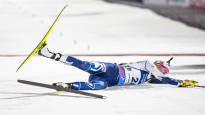The performances of the Finnish national biathlon team at the World Championships in Nove Mesto did not garner huge cheers.
It is also granted by Urheilu’s expert Ville Kotikumpu.
– The races went poorly in terms of results. We didn’t get the best rankings of the season, nor the best performances of the season at least from all the athletes, Kotikumpu admits.
Finland’s best result in individual competitions was Suvi Minkkinen 23rd place on the normal distance. Last year at the World Championships, Minkkinen was eighth on the normal course.
Even then, Minkkinen’s skiing speed spoke. Last season, he was 9 seconds behind the top in the kilometer. Now the difference has been 11 seconds per kilometer.
In an interview with Urheilu on Saturday, Minkkinen revealed that he would like to go to the mountains of Central Europe in the coming summer to get more endurance and thus better skiing speed. It could also mean being left out of the national team during the training season.
Expert Kotikumpu states that the situation is not clear-cut.
– Maximum speed is needed. It could perhaps be practiced even in lighter terrains. Now you have to find a fast skiing speed to keep up with the lead. Now he stays steady all the time. You should probably find a fast skiing speed first and then increase your speed up the hill, Kotikumpu estimates.
Kotikumpu sees that Mari Eder’s the termination may also have had an effect on the results of this season for Finnish women. Eder’s skiing speed was such that he lost an average of three seconds per kilometer to the top.
– There hasn’t been a gauge where to go exactly. When Mari Eder or Kaisa Mäkäärinen has been skiing, has seen exactly the level of world peaks, says Kotikumpu.
In light of this, according to Kotikummu, leaving Minkkiselta alone to train in Central Europe is not the best solution either. Like Mäkäräinen and Eder, Minkkinen should “go hat in hand†and ask the training club.
– You should join the team of someone from another country and then see the difference, Kotikumpu describes.
Cultural differences
Finland’s head coach Erik Bartlett Kulstad has also demanded 100% attendance at the national team’s training activities from the national team athletes.
Kulstad swore by group training on Saturday after the Finns’ last trips to the World Cup.
– If you are not part of the team, I don’t understand what you are trying to achieve. (Exercising in a group) you get competitions, discussion and camaraderie. Of course, you make sacrifices when you want to do something a little differently. Those small differences still don’t make a good or bad athlete, Kulstad said in an interview with Urheilu.
Kotikumpu estimates that Kulstad would not like it if Minkkinen went to train in another country’s sled.
Finland’s former head coach Jonne Kähkönen described to Urheilu on Saturday how the national team’s operating philosophy is managed from top to bottom at his current employer, the Italian Biathlon Federation.
– There are more athletes in Italy. You don’t have to learn culture either. In Finland, it still needs to be learned, because the culture here has been that every athlete has a personal coach and he trains his own protégé, Kotikumpu illustrates.
Kaisa Mä¤räiinen tells when you can leave the national team
Tero Seppälä left the A national team aside last summer until the full attendance required by head coach Kulstad. Seppälä wanted to commit to training with his own personal trainer. On Saturday, after the World Cup job, Seppälä still couldn’t say what he would do in the upcoming training season.
Kaisa Mä¤räinen currently works as Urheilu’s biathlon expert. According to him, everything is always possible. Mämäärinen was left out of the national team at one time because he missed tougher training opponents and also training terrains.
Määäräinen felt that he no longer developed with the resources offered by the national team. Of course, Mäkäräinen reminds that the national team’s resources have grown a lot since those years.
He has a clear view of when it is worth staying outside the national team to train and when it is worth being with the national team.
– The national team is a better option if you can’t look at your own old results to see if there will be development on your own. If you are at a sufficiently hard level and are able to apply for external help, achieving results is not impossible, Mä¤äräinen estimates.
There have been few bright spots in Finland this season Otto Invenius. He competed earlier this season and led Anterselva to ten goals in the World Cup, but the best results are not seen in the World Cup. Invenius has been under Kulstad’s coaching for the first time.
– It can be difficult for a young athlete to know when the peak of fitness will come and what needs to be done before it. What kind of exercises should be done in order to reach peak fitness? Määäräinen reflected on the decline in Invenius’ performance at the World Championships.
